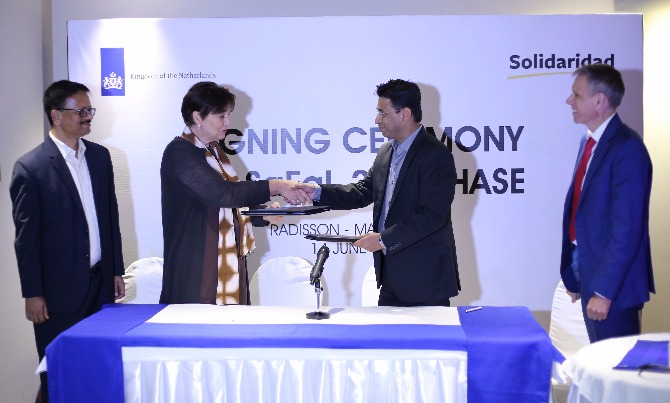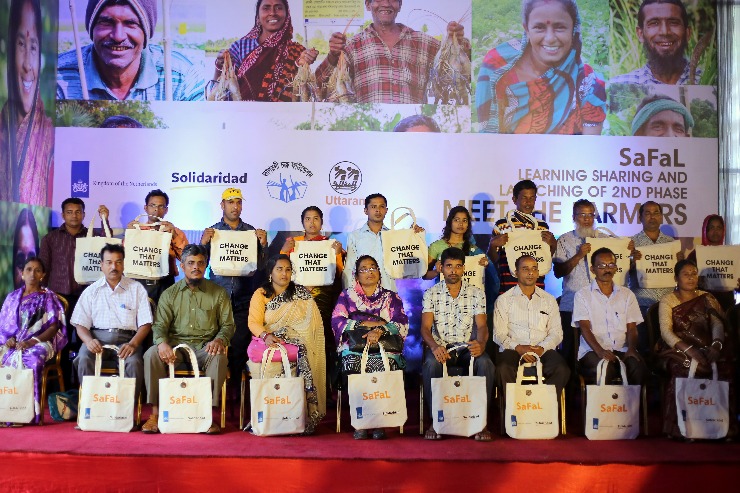
SaFaL’s second phase is a logical continuation of Phase 1 and would directly benefit 0.5 million people or 100,000 farming households. The focus will remain on aquaculture, dairy and horticulture. Soybean would be a new commodity in Phase 2 that will support 25,000 families in the Noakhali and Lakshmipur districts.
SaFaL is expected to contribute towards Bangladesh’s Perspective Plan 2010-2021 for the following focus areas:
- sustainable agriculture and green growth
- higher levels of food production, crop zoning and land use planning
- promotion of agricultural diversification, value chain development, and agricultural credit
- mainstreaming women in agriculture
“By harnessing the expertise and innovation of our two great countries,” said Charge d' Affaires, Martine van Hoogstraten, of the Dutch embassy in Bangladesh, “we are unlocking new opportunities and developing new ways to address development challenges of Bangladesh for zero hunger and zero malnutrition through a market-based approach. The Dutch government strongly recognizes the importance of the agribusiness growth of Bangladesh and is very pleased to contribute to this effort in enhancing the productive life of people through agricultural productivity, entrepreneurship development, income and employment creation, improved food consumption and eco-efficient land and water use,” she said.
Improving market access for SaFaL farmers
The SaFaL programme will enhance commercial agriculture, create rural employment and enhance skills of farmers and workers to adopt sustainable practices in production and market promotion of safe and sustainable food. Through strengthening public-private partnerships, SaFaL will be developing an investment framework for production and market promotion of safe and sustainable food.
Solidaridad Asia Managing Director Dr Shatadru Chattopadhayay said, “The SaFaL programme takes an integrated market-based approach for improving food security in the delta regions of Bangladesh. We will make our 1,500 existing and new producer groups business-wise, self-sufficient and would use the latest agricultural technologies from the Netherlands for improving yields while minimizing impacts on the ecology.”

Better agriculture for better profits
The programme will promote a smart combination between the production of cash crops for the international market and food crops for local demand in the delta region of Bangladesh. This combination is advantageous to farmers in reducing their risks by producing for different markets. From a land use perspective, it provides an incentive for intercropping and crop rotations. Moreover, species and genetic diversification of the agro-ecosystems would create a more climate-adaptive and climate-resilient system.
“We would continue to encourage sustainable investments from the Netherlands and other countries along agricultural value chains in the delta region of Bangladesh. Such market-based approach would give a boost to agriculture and connect industries in the region creating rural employment and prosperity,” Dr Chattopadhayay said. “Solidaridad will continue its endeavours to promote stronger business linkages between smallholder farmers and private sector to strengthen the inclusive participation of the smallholders in the local, national and global value chains."
The Dutch government will work with 100,000 farmers (in Bangla)
Investing in infrastructure and health
The programme is also intended to facilitate large-scale investments in a public-private partnership model to develop a robust infrastructure for inputs and services, credits and equity, and investments in the processing industry. In this way, the next generation of the rural population might find employment in villages without migrating to the city or abroad.
The project would also raise nutrition awareness and stimulate behavioural changes in food habits, health and hygiene. The key focus will be on behavioural change, creating effective communication and community-based shared values, and providing user-friendly, accessible and healthy products and services. The targeted intervention will concentrate on improving dietary diversity and better calorie intake for women, and improving knowledge and attitudes towards sexual and reproductive health rights (SRHR).
About SaFaL
Solidaridad has implemented the SaFaL programme (meaning fruitful, successful or productive in Bangla) programme since November 2012. So far, the project has helped 57,000 smallholder farming families to become successful agricultural entrepreneurs in aquaculture, horticulture and dairy production.
The programme took an integrated approach and connected several aspects that contribute to food and nutrition security. It organized the smallholders into 1,000 producer groups (collective action) and helped them to grow diversified food crops (availability), increase productivity through sustainable practices, improved income (affordability) and connected them to several local, national and international markets (accessibility).
The programme also connected with several Dutch businesses and knowledge institutes in alignment with the vision that markets are becoming legitimate channels for social change and would be key for making the transition from aid to trade.
Learn more about Solidaridad programmes in South and South-East Asia.
Related news:
-
EU food control authority approves safe mangoes from Bangladesh
-
Solidaridad works to close gender gap among farmers in Bangladesh
-
Leading exporters join with Solidaridad to scale safe mango export
